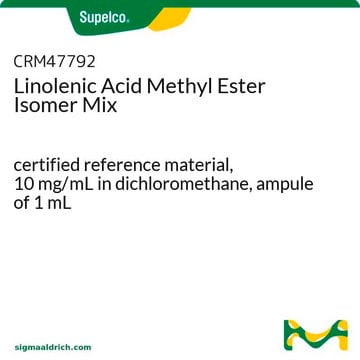62200
Linolénate de méthyle
analytical standard
Synonyme(s) :
cis,cis,cis-9,12,15-octadécatrienoate de méthyle, Ester méthylique d’acide linolénique
About This Item
Produits recommandés
Qualité
analytical standard
Niveau de qualité
Pureté
≥98.5% (GC)
Durée de conservation
limited shelf life, expiry date on the label
Technique(s)
HPLC: suitable
gas chromatography (GC): suitable
Indice de réfraction
n20/D 1.470 (lit.)
n20/D 1.471
Point d'ébullition
182 °C/3 mmHg (lit.)
Densité
0.895 g/mL at 25 °C (lit.)
Format
neat
Groupe fonctionnel
ester
Conditions d'expédition
ambient
Température de stockage
2-8°C
Chaîne SMILES
CC\C=C/C\C=C/C\C=C/CCCCCCCC(=O)OC
InChI
1S/C19H32O2/c1-3-4-5-6-7-8-9-10-11-12-13-14-15-16-17-18-19(20)21-2/h4-5,7-8,10-11H,3,6,9,12-18H2,1-2H3/b5-4-,8-7-,11-10-
Clé InChI
DVWSXZIHSUZZKJ-YSTUJMKBSA-N
Vous recherchez des produits similaires ? Visite Guide de comparaison des produits
Description générale
Application
- Comparative analysis of gas chromatography-combustion-mass spectrometry and gas chromatography-flame ionization detector methods for the determination of fatty acid methyl esters (FAMEs) in biodiesel samples
- Gas chromatography-tandem differential mobility spectrometry (DMS) based separation and quantification of 16 methyl- and ethyl- fatty acid esters from biodiesel samples
- Simultaneous determination of fatty acid methyl esters in commercial food oil samples by gas chromatography-vacuum ultraviolet (GC-VUV) spectroscopy
- Measurement of fatty acid methyl ester composition of various edible oil samples by 1H nuclear magnetic resonance (1H NMR) spectroscopy combined with partial least squares (PLS) method
- Analysis of coffee oil and residue obtained from roasted coffee beans to determine the composition of 11 fatty acids following their methyl esterification by gas chromatography coupled with a flame ionization detector (GC-FID)
- Simultaneous determination of fatty acids in bovine colostrum samples by GC-FID after their derivatization to ester forms using an acidic catalyst boron trifluoride
Autres remarques
Produits recommandés
Code de la classe de stockage
10 - Combustible liquids
Classe de danger pour l'eau (WGK)
WGK 1
Point d'éclair (°F)
235.4 °F - closed cup
Point d'éclair (°C)
113.0 °C - closed cup
Équipement de protection individuelle
Eyeshields, Gloves
Faites votre choix parmi les versions les plus récentes :
Déjà en possession de ce produit ?
Retrouvez la documentation relative aux produits que vous avez récemment achetés dans la Bibliothèque de documents.
Les clients ont également consulté
Protocoles
HPLC Analysis of Fatty Acid Methyl Esters (FAMES) on SUPELCOSIL™ LC-18
Notre équipe de scientifiques dispose d'une expérience dans tous les secteurs de la recherche, notamment en sciences de la vie, science des matériaux, synthèse chimique, chromatographie, analyse et dans de nombreux autres domaines..
Contacter notre Service technique













